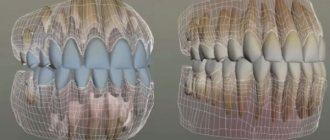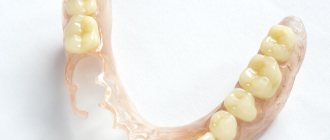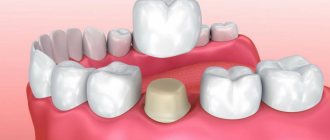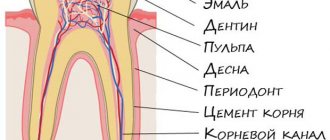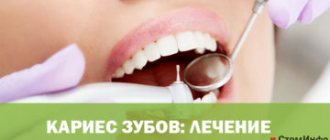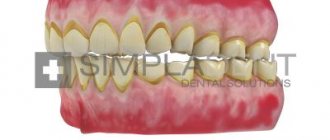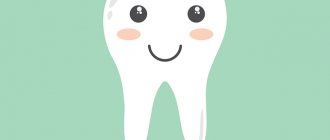At the age of 5–7 years, children begin to experience tooth loss. Each child perceives it differently. Some people are extremely proud of their sudden loss and gladly show off their fallen incisor, instantly feeling like an adult, while others are afraid of an unknown misfortune and are afraid of remaining toothless. During this period, it is important to correctly explain to children that this happens to everyone, and in place of the lost one, a new one will grow. Trying to mentally prepare a child for the inevitable process, many parents consider it necessary to tell him an interesting story or create a playful environment. This is how many rituals appeared related to the first fallen incisor. And also signs arose about where to put a child’s baby tooth.
When does baby teeth change?
The moment when a baby’s lower incisors, as a rule, begin to loosen, can safely be called one of the most exciting in the lives of both children and their parents. Typically, a child's first tooth falls out at the age of 6-7 years. This time for most children coincides with the beginning of school life. This is where the first sign came from: the first tooth fell out, which means it’s time to go to school.
Do not worry too much if the change from milk units to permanent ones does not occur within the generally accepted time frame. They may vary depending on the individual characteristics of the child, the development of his jaw, and the condition of the oral cavity. In this regard, some children begin to lose teeth at the age of five, while others after seven.
Most often, the loss of milk units is preceded by the growth of “sixes”. First, the lower incisors begin to loosen, then the upper ones. That is, their change occurs in the same sequence as growth. So parents have enough time to figure out where to put their baby teeth.
A sign if an adult has a baby tooth
The loss of baby teeth in adults always predicts trouble.
Contrary to the ridicule of ignorant people, baby teeth in adults are not at all uncommon. They can persist for a long time. In some cases - all your life. The anomalous phenomenon is explained by the absence of the rudiments of permanent incisors. This can also happen when they are too deep from the roots of milky specimens. In this case, the incisors cannot push them out and remain inside the gums.
Inadequate development of permanent teeth can be caused by:
- hormonal imbalances;
- hereditary factor;
- disruption of the endocrine glands;
- osteomyelitis of the jaw;
- periodontitis.
It is not at all necessary to part with dairy specimens. If they do not cause concern, there is no need to remove them; they can last for decades.
The loss of baby teeth in an adult always indicates the presence of health problems. Dentists confirm this by recommending an examination of the body.
Superstitions on this score also have exclusively negative interpretations. Among them:
- exposure to other people's negative energy;
- weakening of the aura or a hole in it;
- betrayal of family and friends;
- betrayal, divorce.
Due to the negative consequences, fallen teeth of an adult should not be stored. They are buried or burned, destroying the negative.
Parents' actions when changing primary incisors
Dentists assure that a child whose first teeth are becoming loose does not need pain relief for this process. Although some parents think differently. In fact, before a tooth begins to loosen, its roots dissolve. But discomfort and pain can be caused by a wound formed at the site of a fallen tooth.
Parents of a child whose first tooth has just fallen out can help by:
- Explain that the process of loss is another stage of growing up. Now the child has become very big and can be proud of it.
- Take care of your oral hygiene by rinsing your mouth with a soda solution.
- Warn the child that the wound formed at the site of a lost tooth should not be touched with hands, so as not to cause an infection.
- After eating, suggest rinsing your mouth with warm water. Do this until the wound heals.
Do I need to see a doctor?
Ideally, when baby teeth are replaced, they fall out on their own, meaning no removal is required. But in 80% of cases everything turns out a little differently. The permanent tooth begins to emerge after the milk tooth, when it has not yet fallen out. And since he encounters an obstacle on his way, he changes his direction in the wrong direction. Subsequently, this leads to the formation of an incorrect bite in the baby.
To help the baby tooth leave its place faster and free up the permanent one, you need to consult a doctor. Only a competent specialist can surgically remove a unit of dentition correctly. If you try to do this yourself at home, you can damage the gum mucosa and provoke the development of an inflammatory process. You may also need the help of a dentist in the following atypical situations:
- with swelling and severe pain in the gums;
- with bleeding and long wound healing;
- when a tooth is broken or severely damaged;
- in case of ingestion of a unit of the series.
As soon as a child’s tooth begins to loosen, he is most often in high spirits. Very soon the child will be able to show off to his friends how grown up he has become. At this very moment, parents are overcome by another problem, namely, where to put their baby teeth. You should think about this in advance.
How to get rid of the consequences of omens
If you happen to break a tooth, the signs portend something negative. The event affects the emotional state, causing anxiety and excitement. The situation requires immediate contact with a doctor for appropriate treatment. There are ways to neutralize a bad prediction to restore peace of mind:
- You need to refrain from quarrels and disagreements with loved ones and colleagues. You should not get involved in conflicts in public places. Random skirmishes can cause a strong energy blow.
- The event is often associated with ancestral scenarios and previous generations. You need to go to church, order a service for the repose of your deceased relatives. It is advisable to visit the graves and lay flowers.
- Be sure to visit the oldest representatives of the family - grandparents, parents. Soulful relationships will provide reliable protection from troubles and misfortunes.
If a molar is broken, the negativity can be neutralized by making peace with family and friends
Charity will help return the favor of higher powers. It is necessary to do good deeds with an open heart. You can help a lonely neighbor or feed a homeless kitten. Everyone will find a way to enlist the support of fate.
Where to put a lost baby tooth?
As you know, in most children the lower primary incisors are the first to leave the dentition. And even if this event did not happen at home, but in a dental clinic, the doctor is obliged to give the child his tooth. And already at home, mom and dad will decide for themselves what to do with the child’s fallen baby teeth. But most parents don’t dare throw it in the trash.
Many mothers carefully store objects that remind them of the first years of their baby's life. These include an ultrasound picture taken during pregnancy, a tag from the maternity hospital, and the first curl cut at 1 year. It is along with these things that most mothers prefer to store the first tooth that falls out.
If parents are superstitious enough, they can conduct a real ritual of farewell to the milk element with their child, which he will remember for the rest of his life and will be able to pass on this tradition to his children. To do this, you should get acquainted with the signs of different peoples of the world in advance.
When do you need a doctor?
Usually, replacing baby teeth with permanent ones occurs painlessly in children. Often, having lost a tooth while playing, kids give them to their parents and forget about them. Some people ask not to throw it away, because it will be very interesting to play with it later. But in some cases, the help of a doctor is necessary. In what?
- If the permanent ones are already making their way out, but the milk ones have not yet fallen out.
- When permanent teeth take too long to emerge.
- If tooth sockets bleed for too long.
- When, after a tooth falls out, the gums become swollen and painful.
Note! When your child turns 5, check his mouth regularly to make sure his permanent teeth are still in place. If this process begins before their temporary replacements fall out, the dentition will be crooked. In this case, eating solid foods will help. In some cases, the help of a dentist is required.
In general, the replacement of baby teeth with permanent ones occurs without any problems. Of course, parents should periodically examine the child's mouth and monitor his emotional state. If everything goes according to plan, and the baby perceives the situation calmly, there is no need to worry. It’s up to the parents to decide where to put their baby’s lost baby tooth. Some keep it as a memory, others use it as a talisman, others throw it away and forget about it. Many mothers and fathers stage entire theatrical performances to make this event interesting for the baby and remain in his memory for a long time.
Is it possible to store baby teeth?
Until recently, it was believed that elements of the dentition that had fallen out independently or surgically removed should be immediately disposed of. Black magicians, witches and sorcerers could steal them from home and plot or damage them. That's why parents didn't stand on ceremony about where to put their baby teeth. They were thrown away or buried deep in the ground.
Today, the opinion about methods of disposal of fallen baby teeth has changed dramatically. The fact is that British scientists have learned to extract stem cells from pulp. It has been proven that their potential is much stronger than biomaterial taken from the umbilical cord of a newborn. To find out more about this, parents can contact a stem cell storage bank. Biomaterial is stored in this medical institution at a temperature of -196 °C. Frozen cells can later be used in the treatment of serious diseases, including bone marrow transplantation.
What to do with a child’s baby teeth: folk signs
From time immemorial, each nation has had its own traditions and customs regarding the storage of fallen child teeth. For example, nomadic tribes always buried them. Therefore, there were no questions about what to do with the child’s baby teeth. The parents had to dig a deep hole, put the tooth in it and cover it with earth. It was believed that this was the only way to protect the baby from damage and misfortune.
The peoples of Britain had their own traditions regarding where to place a child's baby teeth. Folk customs boiled down to preventing damage to a child using a tooth. For this purpose, any milk element of the row was burned immediately after falling out. It was believed that in this case a strong and healthy one would quickly grow in its place.
Another sign common among the British in ancient times is associated with animals. It was believed that the tooth should be destroyed, hidden or buried so that a predator would not get it and eat it. If this happens, the child will grow fangs, like an animal.
Today all these signs seem strange and funny, but our ancestors sincerely believed in them and, worried about the fate of their children, unquestioningly carried out all these actions.
Signs when the first tooth appears
There are several different signs among people that refer to the appearance of a child’s first incisors. The usual period in which they begin to grow in babies is the age of 5–6 months.
If the tooth erupted earlier or later, this was a reason to judge the possible future of the child. We paid attention not only to the time of appearance, but also to the sequence of filling the dentition and the structural features of the jaw:
- If the first tooth comes out beyond y - the birth of a brother or sister a year after the baby was born.
- If teeth appeared with a delay relative to the traditional period (later than 7 months), the child was predicted to have talent and great achievements in a certain area.
- If a coin, turned edgewise, was placed between the baby’s two central upper teeth , the parents believed that their child would be successful with the opposite sex. The second interpretation is luck in adult life.
- The baby was born “toothy” or he first developed fangs - a bad sign, foreshadowing imminent death or service to evil in adulthood. But there is also the opposite interpretation - in adulthood a person will be very successful and lucky.
These superstitions can hardly be called relevant, because dentists have long proven that the speed of tooth formation and the structure of the jaw is determined by the innate characteristics of each child, and not by mystical reasons.
There is a belief that will help young mothers determine the moment when they can start complementary feeding.
The sign says that when the first tooth comes out, the baby should be given a spoon made of silver, and be sure to knock on the tooth with it. This action symbolized that the baby could already eat something other than his mother’s milk.
Why give a tooth to a mouse?
Among the Slavic peoples, one of the signs of where to put a baby tooth was associated with throwing the fallen unit behind the stove. This was done for a brownie or a mouse. They had to take the baby tooth and bring the molar tooth in return.
In some European countries, they also adhere to the custom of placing the tooth under the pillow at night. But it’s not the kind tooth fairy with wings and a magic wand in her hands who should take it, but a little mouse. In France she is called La Petite Souris, and in Spain - Perez. Traditionally, at night, an unnoticed little mouse sneaks under the pillow to exchange a tooth for money or treats. Children eagerly await the appearance of this rodent in order to receive something nice as a gift.
The history of the occurrence of signs
Modern dentistry is the most highly developed medical branch. In case of diseases or changes in them, a person usually goes to the dentist for an appointment. Our ancestors saw fateful signs in such cases. Therefore, today you can hear various superstitions associated with extracted wisdom teeth.
Previous generations did not know why a “smart” molar grows or falls out. There was little talk about removal back then. Basically, they preferred to associate painful symptoms with their future life.
Even if the pain is unbearable, when a tooth comes out and it hurts a lot, this is a good sign. The stronger, the more fortune will bring good luck.
Who is the tooth fairy?
In many countries of Northern Europe, America and Canada, they adhere to a different sign about a child’s baby teeth. People here know where to put the dropped element of a row almost from birth. Kids eagerly wait until their tooth begins to loosen so that after it falls out, they can put it under their pillow. In return, the good fairy should bring a coin there. This tradition is one of the most widespread and popular today. By the way, the fairy tale about the tooth fairy and the mouse Perez was invented by the Spanish writer Luis Coloma for the eight-year-old King Alfonso VIII, who lost his first baby tooth.
The myth of the good sorceress is a useful one. It helps the child overcome the fear of a lost tooth and allows him to receive monetary or other pleasant compensation for the loss.
Why is it growing?
This question was asked in ancient times by the Slavs, Germans and Indians. The appearance of a wisdom tooth for them was a sign that a person had achieved a certain spiritual wisdom and received the protection of the spirits of the family. It was also believed that they appear at that period of a person’s life when he is able and ready to accept new knowledge. Losing such a tooth was a bad sign. It meant a decrease in wisdom and loss of ancestral protection.
In the modern world, each person independently decides for himself to preserve or remove a wisdom tooth. The presence or absence of “wise” teeth is determined by heredity, quality of nutrition and previous dental measures.
Today, the appearance of a wisdom tooth brings nothing but pain, agony and discomfort. There can be no talk of any honor or glory. Teething can cause fever and insomnia. It is not always possible to remove it the first time, even with the help of dentists.
Even if the erupted tooth does not bother you, it will still have to be removed sooner or later. But you shouldn’t do this right away, unless of course it bothers you, because the appearance of the root eight promises pleasant gifts of fate to their owner.
Do you need a gift?
Regardless of where the mother decides to put her child’s baby teeth, where to put them or to throw them away altogether, it will be very good if she prepares some surprise for the baby. This will make it easier for him to bear the loss.
If a child puts a tooth under his pillow, the first thing he will do when he wakes up is check to see if the mouse or tooth fairy took his treasure. If yes, then a coin or present should appear in this place. This could be a book, a coloring book, a set of pencils, paints or markers. Parents should choose gifts that can easily fit under the pillow. If the gift is too large, then it will have to be placed next to it.
It is not recommended to give chocolate, sweets and other sweets. The tooth fairy cares about the health of children's teeth, so she should give them only useful gifts. And as you know, sweets quickly begin to deteriorate your teeth. It is better to put a coin under the pillow, and for it the child will buy what he likes.
"Dental" rituals
Even ancient parents thought about where to put a child’s baby tooth. Here are the solutions they found:
- Tooth Fairy. In many European countries and America, a “magical” solution to the problem with the help of “tooth fairies” has long been common. The parents put the fallen tooth under the pillow at night, and the next morning they take out a coin or a gift from the fairy. Children usually like this game.
- Burning a tooth. In England, superstitious parents in the past burned their children's lost teeth, fearing that someone would use them for witchcraft purposes. In addition, in their opinion, this protected the babies from the appearance of fangs in the place of the old incisors.
- Gift for a mouse. This funny and strange custom originated in Rus' and is still practiced in many families. The child clamps the “burdock” tooth in his fist, and then asks the mouse to replace it with a “bone” one and throws it behind his back.
- Tribute to the spirits. In addition to mice in Rus', milk teeth were picked up by perfume or brownies. The children made the same request to them as they did to the mouse, hoping that this would make their jaws stronger.
Today, to calm their children, parents most often resort to a fairy tale with a fairy or a mouse. However, children cope well with the loss of an incisor even without these fantastic stories. Often it is enough just to explain that what is happening to them is a normal part of the process of growing up and that soon strong adult teeth will appear in their mouth instead of temporary ones. Children always want to grow up quickly, so this explanation will calm them down.
Additional Information. Children's milk teeth are often unreasonably given great importance, believing that they are endowed with some kind of charm. So, some wives sew them into their husbands’ clothes so that they do not leave the family. Others wear them around their neck or in their pocket as a talisman. All this is nothing more than superstitions from the past.
Traditions of the peoples of Asia
In many Middle Eastern countries, children do not leave their lost tooth to a mouse or fairy. Instead, they throw it up towards the sun. It is believed that this will allow teeth to grow faster and stronger than before.
A similar sign of where to put a lost baby tooth is followed in Japan. To get a new one instead of the old one, you need to make a good straight throw. But the bottom tooth should be thrown up, and the top one down, that is, in the opposite direction.
Tales related to wisdom teeth removal
The funniest story was the one that claims that if you remove wisdom teeth, your cheeks will not bulge, and your face will become more perfect.
Among other tales, there are those that say that wisdom teeth can take calcium from other teeth. And also that anomalies in the eruption of the eighth teeth can lead to crowding of teeth in the central group or even to the arrangement of the teeth of the upper jaw in the shape of a “fan”.
Of course, none of these tales are scientifically substantiated , although the latter may be genetic. But it’s true that such an anomaly can occur even without wisdom teeth.
So you shouldn’t believe in all the fables and, first of all, show the doctor what has grown there and find out what to do about it.
Tooth on the roof
Throwing up fallen milk elements is a fairly common sign among many nations. But children in some countries strive precisely to throw a tooth onto the roof. This is done in Greece, Brazil, Ethiopia, and Sri Lanka. But in China, Korea, Vietnam and India, this is done only with the lower teeth, and the upper ones, on the contrary, are thrown under the bed or even hidden in cracks in the floor. And every baby knows where to put baby teeth.
You need to throw your teeth onto the roof so that a bird or squirrel can grab it faster. Then a new one will very quickly grow in its place. And a tooth under the bed, most likely, can easily be dragged away by a mouse.
Signs associated with wisdom teeth
Gypsies say that if you bury your wisdom tooth in a cemetery, within six months you will become rich.
It was the Slavs who gave this name to the teeth. It was believed that only a wise person with rich life experience could acquire wisdom teeth.
And they didn’t really want to delete them, because they were afraid to lose direct evidence of their wisdom. And only when it was noticed that eighth teeth can grow in people who are deprived of even a hint of wisdom, they decided that they were mistaken and began to remove them. And before that, in order to prevent teeth from hurting during teething, a person who felt the beginning of the appearance of a tooth had to whisper into the water in which the moon (always full) is reflected: “My wisdom, my protection, mind you, pain and illness are not mine!” " Then they drank this water or rinsed their mouth with it.
But we are civilized people, so let's go to the doctor without fear when we realize that a tooth is breaking free. And then all worries will go away.
Maybe the tooth needs to be hidden?
Not everyone wants to give their lost treasures to an animal or some fairy-tale creature. In Nepal it is considered very bad luck if a bird takes a tooth and does something with it. In this country, children come up with their own secret storage places that even adults don’t know about.
In Malaysia, fallen milk teeth are also hidden, but only in the ground. The kids bury them, thus returning them back to nature.
In Turkey, parents believe that with the help of baby teeth they can influence their child’s choice of future profession. So, they bury the fallen elements near the hospital if they want their child to be a doctor, or near the school if they dream of seeing him as a teacher. Football fields are especially popular.
Signs if a wisdom tooth grows during pregnancy
It cannot be said unequivocally that molars come in at a strictly defined time over a certain number of days. Many eyewitnesses complained that the incisor began to grow, died down, and a month later erupted again, and this process in total could drag on for years.
If a woman is planning a child, she is often advised to first get her teeth in order, since sometimes their treatment requires medication, which is unacceptable either during pregnancy or during breastfeeding.
But if the molar nevertheless began to erupt during such a significant period, the Universe suggests that the future baby will be smart and gifted. It’s not good if the incisor crumbles, breaks, or brings unpleasant sensations. It is believed that the child will be troublesome and capricious, which will carry over into his adult life.

